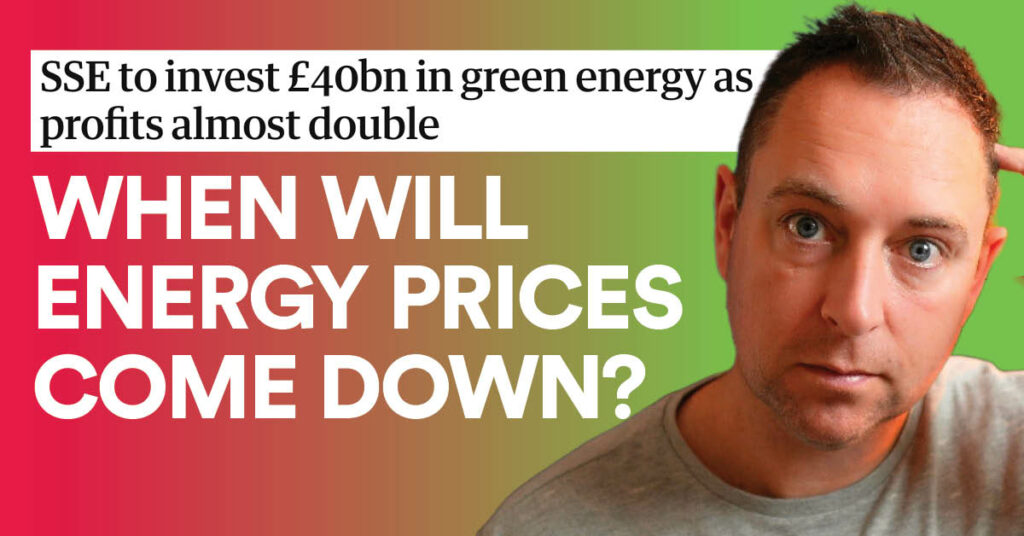In my hand I have the press release from SSE, where they announced that profits have just about doubled this year from £1.16bn to £2.18bn. When I first saw the press release, like many customers around the country I was angry. My gas bills have considerably increased and have done so through no fault of my own. In fact, even with all the measures you can comfortably, uncomfortably or affordably put in place, our gas bill rose significantly these past 12 months.
While I don’t like it, I’m fortunate that I can weather this price increase. But there are horror stories of people at home this past winter choosing between heating their home and eating. An isolated incident is one too many, but this was happening across the country. Is this a gas crisis or a cost-of-greed crisis?
Why have energy companies’ profits increased?
The margin energy companies take is a percentage of the sale price. As the costs of gas have risen considerably since the Russian invasion into Ukraine, so too have the profits of energy companies such as SSE. All things considered, other costs in such businesses have not increased at the same rate as the wholesale price of gas and so this cost increase becomes a significant boost to the profit margin.
Gas and electricity companies such as SSE have higher profit margins than many other sectors. And many of you, and I are calling for intervention to cap the unit price that can be charged to consumers.
When looking at the accounts SSE has made public, earnings from its gas-fired power stations surged almost fourfold to £1.24bn for the last financial year, up from £331.1m the year before and ultimately this makes up a huge chunk of its increased profit. These power stations benefited from the huge surges in wholesale prices because they were able to quickly meet shortages in supply. Such shortages happened when French nuclear plants that also supply the UK sustained outages in 2022. Closure of UK nuclear plants and according to SSE, unseasonally calm weather during the winter months affected renewable options and exacerbated this also.
What about the windfall tax?
Last year the UK government introduced a windfall tax on low-carbon electricity generators. This was in response to the perception that renewables were the catalyst for the increase in profits. SSE low carbon electricity generators saw a small growth in revenue this past year and since this windfall tax came into effect in January 2023 the tax liability to the company is around £43mn.
The tax does not apply to gas-fired power stations. This means the majority of the profits are not applicable for this windfall tax.
You are the customer, not the owner
In my understanding, SSE hasn’t increased their profit margin, nor too have they reduced it. And it’s important to remember that you are the customer of SSE. Not the owner. Their role to you and to me is to provide a service, to provide gas and electricity to our homes. Their role to the shareholders is to increase profit.
Will prices come down?
Last week, the government ruled out more help for homes with energy bills despite costs remaining historically high. SSE said it was expecting a “sustained higher price environment in the medium term” and separately in a forecast that many of us will gasp at. Cornwall Insight an energy market intelligence consultancy has released estimates with a warning that they do not expect gas and electricity bills to return to pre-2020 levels “before the end of the decade at the earliest”.
In short higher prices are here to stay unless the energy regulator step in and they are slow to act if they’ll do so at all.
- “The one thing that’s worse than paying high prices is not being able to pay high prices.” – Paul Samuelson
What is SSE doing about it?
In this same press release, Alistair Phillips-Davies downplays the huge increase in profits with significant discussion on investments. With up to £40bn being invested over the next 10 years, a huge focus will be on renewable energy sources to reduce reliance on gas. We’re being told by Alistair that this “was a gas crisis” and that this investment in renewable energy will help us move away from fossil fuel reliance.
While SSE’s commitment to a cleaner energy future is commendable, the profit announcement being included in the investment press release feels like misdirection or fodder. Transitioning to renewables also raises questions about how the costs of this move will impact consumers, especially those who are already facing high energy prices. It’s crucial that this switch to renewables does not come at the expense of future consumer affordability. Though in reality, we’d be naive to think it will positively impact our pockets anytime soon.
What can we do about it?
As we approach summer, and our reliance on heating and to an extent electricity is lower than in winter months, it’s time to put preparations together to reduce our costs later in the year. You already know the drill, turn down your heating, insulate your home, changing out your bulbs for energy-efficient LEDs. These are now par for the course.
High energy costs are here to stay. Let me know your thoughts and if you’ve any tips for saving on gas or electricity, please feel free to share them


